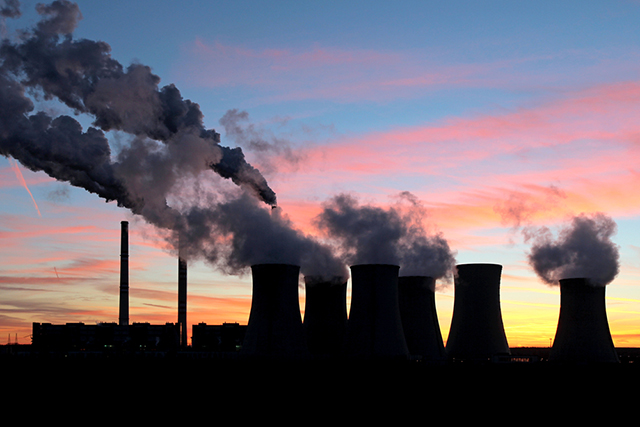
This week, the White House announced the “American Business Act on Climate Change” pledge, which contains pledges to reduce carbon emissions from 13 of the country’s largest corporations. Together their pledges amount to “$140 billion in new low-carbon investment” and “1,600 megawatts of new renewable energy” projects.
The July 27 announcement of these pledges has been widely heralded as a game-changing, important move by major industry players in the fight to reduce the harmful effects of anthropogenic climate change. ThinkProgress described the move as “meant to demonstrate industry support for strong carbon reduction goals.”
This certainly rings true for some on the list, though the growth-oriented model that they all share suggests that none will actually do all that is necessary to roll back the negative effects of climate change.
Nevertheless, industry policies do make some difference. Google has a demonstrated track record of increasing its reliance on renewable energy and has participated in lobbying for investment in it. Google has also lobbied for easier access to renewable energy in parts of the United States, where it is currently restricted by pro-fossil fuel interests. And General Motors was awarded a perfect score in 2014 by the Climate Disclosure Project for its efforts to reduce greenhouse gas emissions and foster a sustainable business model, which suggests that its stated goals for 2020 are already in process.
Microsoft’s set of “commitments” is so vague as to not even include any target dates.
However, for some other companies on the list, the gesture, when considered in the context of overall business operations and carbon impact, seems mostly symbolic. Bank of America, though it vowed in 2014 to cut investments in coal in response to the fossil fuels divestment movement, voted down a proposal that would have required it to make transparent the carbon impact of its other substantial investments in fossil fuel initiatives. On this issue, Ceres, a nonprofit dedicated to fostering a sustainable economy, wrote, “a bank’s financed emissions typically dwarf its other climate impacts.” This reality raises the question of how significant Bank of America’s pledge to fund up to $125 billion in sustainable business initiatives by 2025 really is.
The same critique can be made of Berkshire Hathaway Energy (primarily owned by Berkshire Hathaway) and Goldman Sachs, which have larger portfolios of investments that do not signal “strong carbon reduction goals.”
PepsiCo, Coca-Cola and Cargill are framed as climate change leaders for signing on to the act, despite the fact that their manufacturing operations and sourcing policies are well-known to be massively destructive to the earth’s environment in terms of resource extraction, soil and forest depletion and pollution – all of which fuel anthropogenic climate change.
Alcoa, one of the world’s largest aluminum manufacturers, has directed its pledge of reducing greenhouse gas emissions by 50 percent by 2025 (over 2005 numbers) at its US facilities, although a substantial portion of its extractive and smelting operations – and thus carbon emissions – happen overseas.
Meanwhile, Alcoa remains a member of the anti-renewable energy coalition, the American Legislative Exchange Council, known as ALEC, as does UPS, which raises questions about the veracity of the pledges made by both.
Microsoft’s set of “commitments” is so vague as to not even include any target dates, and any real evidence that it is in fact moving to power its data centers with renewable energy is lacking. As Greenpeace observed in its 2015 “Clicking Clean” report, “Microsoft’s strategy for reaching its ‘carbon neutral’ commitment remains primarily reliant on the purchase of unbundled renewable energy credits and carbon offsets, which have little if any impact on the energy powering its data centers.”
And finally, there’s Apple and Walmart, both of which continue to direct attention to energy efficiency and carbon reduction at their US operations, despite the fact that the vast majority of their greenhouse gas emissions impact on the world stems from the manufacture of the products they sell. In both cases, manufacture of goods mostly takes place in China, where production is powered by dirty coal. And in the case of Apple, the production of those goods is increasing in carbon intensity.
So while it’s certainly a good thing that Apple will add 280 megawatts of renewable energy to power its retail, corporate and data facilities in the United States and China by 2016, these initiatives represent just 1 percent of the company’s 2014 carbon footprint. If Apple’s leaders were truly serious about reducing the company’s impact on climate change, they would invest in renewable energy sources for production facilities. The rest is really just child’s play. Especially considering that the total industry pledge of 1,600 megawatts of renewable energy would power just three medium-sized factories.
Angry, shocked, overwhelmed? Take action: Support independent media.
We’ve borne witness to a chaotic first few months in Trump’s presidency.
Over the last months, each executive order has delivered shock and bewilderment — a core part of a strategy to make the right-wing turn feel inevitable and overwhelming. But, as organizer Sandra Avalos implored us to remember in Truthout last November, “Together, we are more powerful than Trump.”
Indeed, the Trump administration is pushing through executive orders, but — as we’ve reported at Truthout — many are in legal limbo and face court challenges from unions and civil rights groups. Efforts to quash anti-racist teaching and DEI programs are stalled by education faculty, staff, and students refusing to comply. And communities across the country are coming together to raise the alarm on ICE raids, inform neighbors of their civil rights, and protect each other in moving shows of solidarity.
It will be a long fight ahead. And as nonprofit movement media, Truthout plans to be there documenting and uplifting resistance.
As we undertake this life-sustaining work, we appeal for your support. We have 9 days left in our fundraiser: Please, if you find value in what we do, join our community of sustainers by making a monthly or one-time gift.